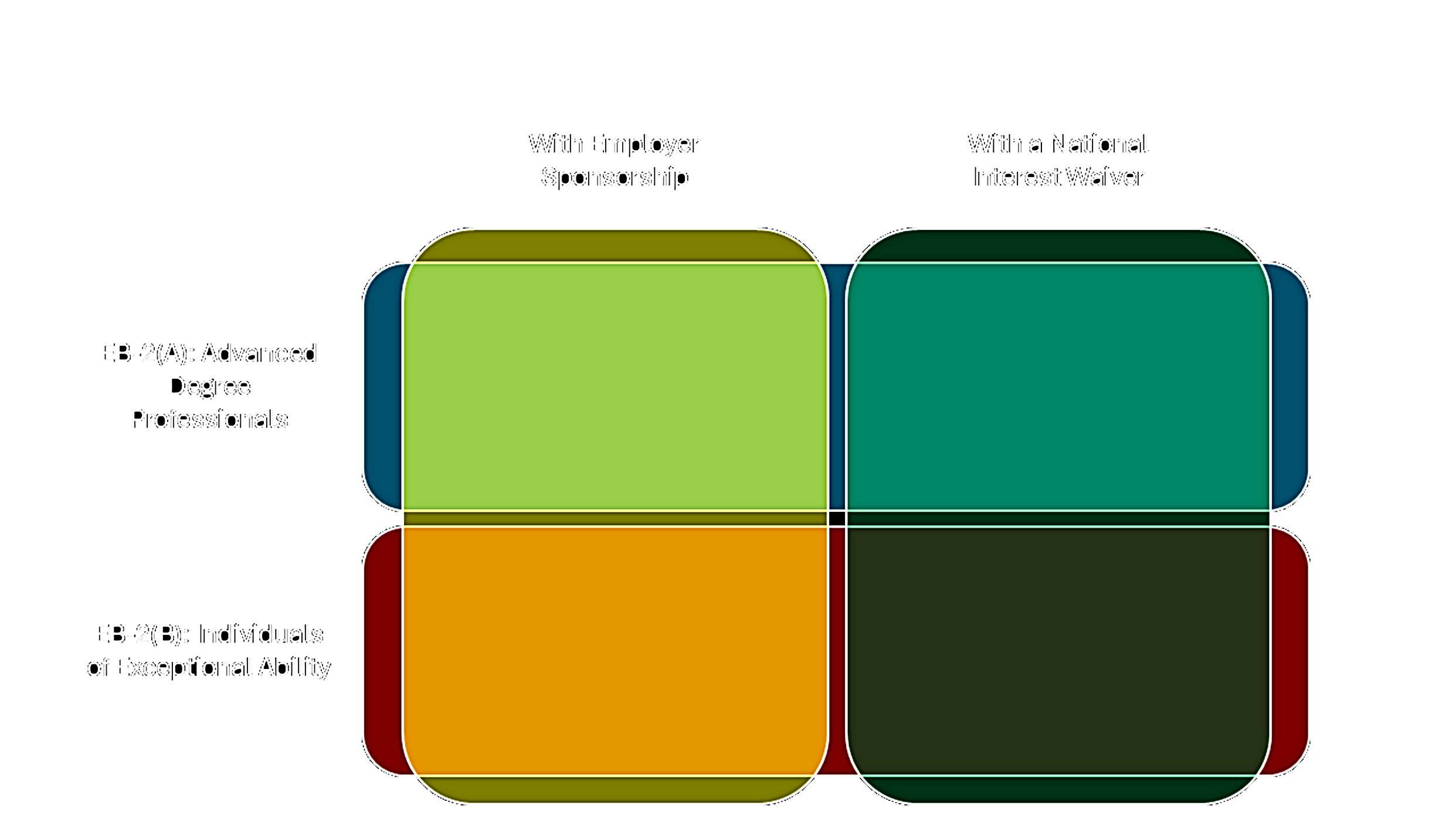Building a Case for Exceptional Ability or an Advanced Degree (EB-2)
Date of Information: 05/10/2025
Please check back soon; we update these materials frequently.
Are you a high-achieving professional with unique expertise? You may qualify for permanent residence with an EB-2 Exceptional Ability visa. At Charles International Law, we guide you step-by-step to build the strongest possible petition—whether you're just exploring or ready to file.
What Is the EB-2 Visa?
The EB-2 visa is a second-preference employment-based visa designed for individuals with advanced degrees or exceptional ability.
There are four variations:
Eligibility Criteria
Exceptional Ability (8 CFR § 204.5(k)(3)(ii)):
You must meet three of these six criteria:
Official academic record showing that you have a degree, diploma, certificate, or similar award from a college, university, school, or other institution of learning relating to the area of exceptional ability, as required by 8 CFR § 204.5(k)(3)(ii)(A)
Documentation in the form of letters from current or former employers showing that you have at least ten years of full-time experience in the occupation for which you are being sought, as outlined in 8 CFR § 204.5(k)(3)(ii)(B)
A license to practice the profession or certification for a particular profession or occupation, as specified in 8 CFR § 204.5(k)(3)(ii)(C)
Evidence that you have commanded a salary, or other remuneration for services, that demonstrates exceptional ability, per 8 CFR § 204.5(k)(3)(ii)(D)
Evidence of membership in professional associations, pursuant to 8 CFR § 204.5(k)(3)(ii)(E)
Evidence of recognition for your achievements and significant contributions to the industry or field by your peers, government entities, or professional or business organizations, in accordance with 8 CFR § 204.5(k)(3)(ii)(F)
Keep in mind: USCIS officers are not subject-matter experts in your field. You may be globally recognized for your work, but unless your qualifications are clearly mapped to the enumerated criteria in the federal regulations, they may not fully appreciate the significance of your achievements. For that reason, it is essential to structure your application around the checklist outlined in 8 CFR § 204.5(k)(3)(ii), which USCIS uses to assess eligibility for the "exceptional ability" designation. Each claimed criterion should be supported by credible, organized documentation and written in accessible terms that highlight relevance and impact. Even Nobel-Prize-caliber work can be misunderstood or undervalued if it’s not explicitly tied to these regulatory factors.
Advanced Degree Professionals (8 CFR § 204.5(k)(2)):
To qualify as an advanced degree professional under the EB-2 category, you must possess either:
A U.S. advanced degree (Master’s or higher) or a foreign equivalent degree, or
A U.S. bachelor's degree (or foreign equivalent) plus at least five years of progressive post-baccalaureate experience in the specialty.
It’s important to clearly document both the degree and the progressive nature of the work experience through transcripts, credential evaluations (if applicable), and detailed letters from employers. USCIS will look closely at whether the experience was gained after completion of the bachelor’s degree and whether each subsequent position reflects an increase in complexity, responsibility, or knowledge applied.
Citing the regulatory framework under 8 CFR § 204.5(k)(2) provides adjudicators with a clear, checklist-style path to follow—something they heavily rely on when reviewing petitions, especially in fields where they may not fully understand the applicant’s advanced professional background.
Specific Documentation that Will Strengthen Your Application:
A detailed resume or curriculum vitae
Copies of diplomas, transcripts, and credential evaluations (for foreign degrees)
Letters of recommendation from experts in your field
Employer support letter, if applicable
Proof of current lawful status, if applying from within the U.S.
Passport biographic page and prior U.S. immigration documents (visa stamps, I-94, etc.)
Any prior USCIS or Department of Labor decisions relating to previous petitions
A comprehensive list of your publications, presentations, or media appearances
Contact details for referees who can write expert letters (ideally from different institutions and countries)
Details of any awards, honors, or professional recognition
Membership certificates or leadership positions in professional associations
Documentation of past and current salaries (pay stubs, offer letters, contracts, etc.)
Project summaries or grant documentation that highlight the impact of your work
Any metrics or analytics (citations, patents, performance data) that quantify your influence
Timeline of your education and career progression
Past immigration filings and outcomes, if any
Frequently Asked Questions (FAQ)
1) What does “exceptional ability” mean under U.S. immigration law?
It means a degree of expertise significantly above that ordinarily encountered in the sciences, arts, or business. USCIS measures this against specific regulatory criteria in 8 C.F.R. § 204.5(k)(3)(ii).
2) Who can apply under the exceptional ability standard?
Foreign nationals in the sciences, arts, or business who can meet at least three out of seven regulatory criteria. This includes—but is not limited to—professionals without advanced degrees who still have a demonstrable record of expertise.
3) What are the seven regulatory criteria for exceptional ability?
Official academic records in your field
Letters showing at least 10 years of full-time experience
Professional licensure or certification
Evidence of salary or remuneration that demonstrates exceptional skill
Membership in professional associations
Recognition for achievements and significant contributions
Comparable evidence if the above don’t readily apply
4) Do I need to meet all seven criteria?
No. Meeting any three out of seven is sufficient. The stronger your supporting evidence, the better your case.
5) Is a job offer required?
Typically, EB-2 petitions require a job offer and PERM labor certification. But applicants seeking a National Interest Waiver (NIW) can bypass those requirements by showing their work benefits the United States under the Matter of Dhanasar framework.
6) What kinds of evidence are persuasive?
Objective, verifiable documents: contracts, pay records, awards, press, professional licenses, membership letters, publications, and expert testimonials that explain your impact.
7) Can entrepreneurs or self-employed professionals qualify?
Yes. Entrepreneurs, consultants, and solo practitioners can rely on evidence of successful projects, revenues, client testimonials, and industry recognition—mapped to the exceptional ability criteria.
8) How does exceptional ability differ from the advanced degree EB-2 option?
The advanced degree route requires a master’s degree or higher (or bachelor’s + 5 years of progressive experience). Exceptional ability is an alternative path for those who may not hold advanced degrees but can prove a substantially higher level of expertise.
9) How long does the process take?
Processing times vary by USCIS service center, whether premium processing is used, and whether you are filing concurrently with adjustment of status. Expect months for I-140 review, with premium processing providing a 15-day decision window.
10) What happens if USCIS isn’t convinced I meet exceptional ability?
They may issue a Request for Evidence (RFE) asking for additional documentation. A carefully prepared initial filing, with expert legal guidance, reduces the risk of delays or denials.
Need Help with an EB-2 Application?
Ready to put your expertise to work in the U.S.? Schedule a consultation with Charles International Law to evaluate your qualifications, map your evidence to the exceptional ability criteria, and create a strategy tailored to your immigration goals


